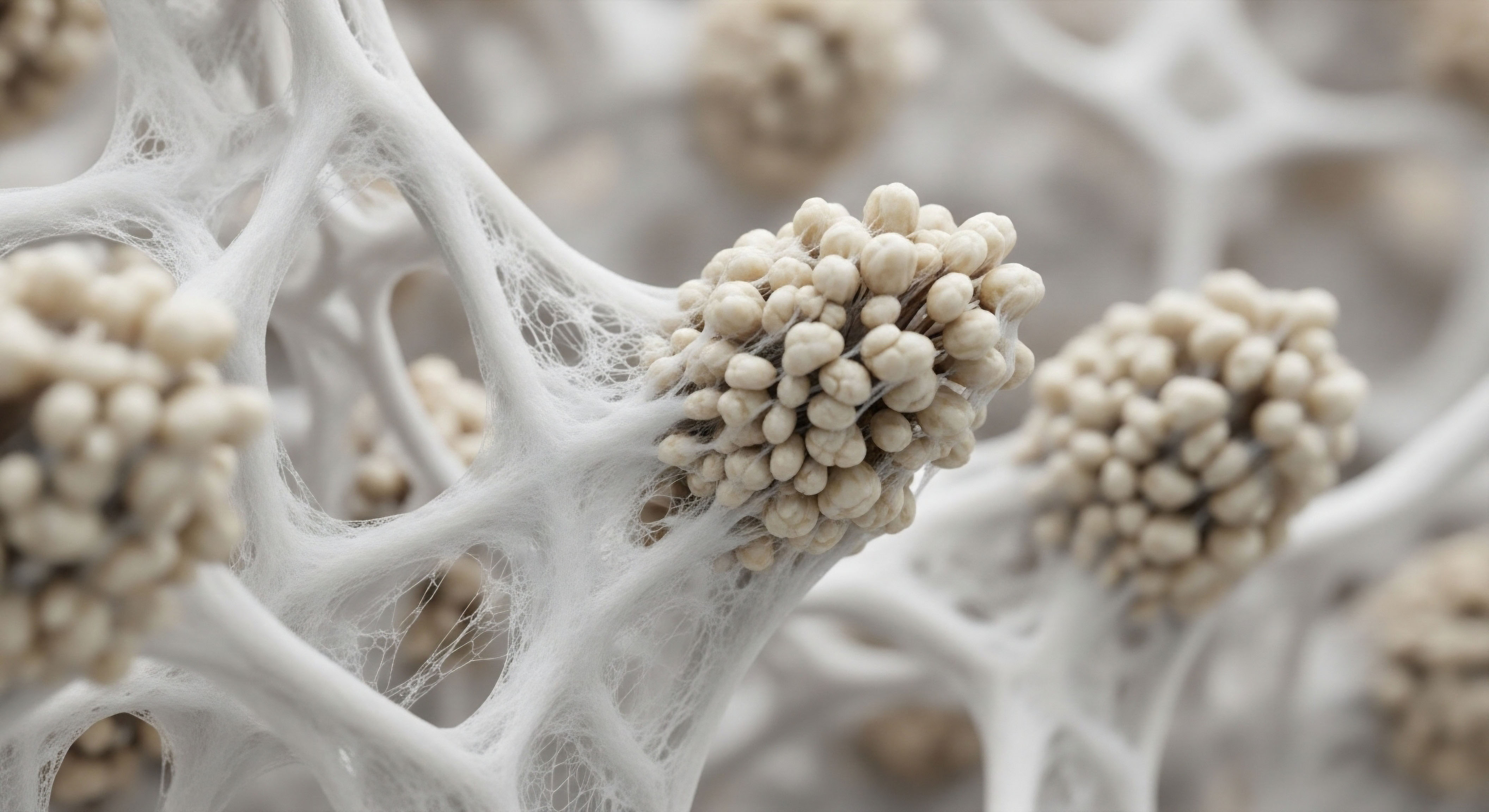

Fundamentals
Perhaps you have felt it ∞ a subtle shift in your body’s rhythm, a persistent feeling of being “off,” or a collection of symptoms that defy easy explanation. Many individuals experience these sensations, often attributing them to stress, aging, or simply an unavoidable part of life.
Yet, beneath the surface of these lived experiences lies a sophisticated biological network, constantly striving for equilibrium. When considering therapeutic interventions involving injected hormones, understanding how your body’s internal defense system interacts with these external biochemical signals becomes paramount. This interaction is not a simple, one-way street; rather, it represents a dynamic conversation between the endocrine system, which orchestrates hormonal messaging, and the immune system, your body’s vigilant protector.
The concept of introducing exogenous substances into the human body naturally raises questions about the systemic response. Your immune system is designed to identify and neutralize anything perceived as foreign, whether it is a pathogen, a toxin, or even a therapeutic compound. Hormones, despite being naturally occurring molecules, can elicit a range of immunological reactions when administered externally, especially in injectable forms. These responses are not always adverse; often, they represent the body’s adaptive capacity, recalibrating its internal environment.

The Body’s Internal Messaging System
Hormones serve as the body’s chemical messengers, transmitting instructions between cells and organs to regulate nearly every physiological process. From metabolism and mood to sleep and reproductive function, these biochemical signals maintain a delicate balance. When this balance is disrupted, symptoms can manifest in various ways, prompting individuals to seek solutions, including hormonal optimization protocols.
The endocrine system, a network of glands producing these hormones, works in concert with other major systems, including the nervous and immune systems, to maintain overall physiological stability.
The immune system, on the other hand, functions as the body’s security force, distinguishing between “self” and “non-self” to protect against threats. This intricate defense mechanism involves various cell types, proteins, and signaling molecules that coordinate responses to foreign invaders or abnormal cells.
When an injected hormone enters the bloodstream, the immune system assesses this new presence. The ensuing reaction depends on several factors, including the hormone’s molecular structure, its concentration, the frequency of administration, and the individual’s unique biological makeup.
Understanding your body’s internal communication and defense systems is essential when considering external hormonal support.

Initial Immune System Recognition
Upon injection, the body’s innate immune system is the first line of defense to encounter the exogenous hormone. This immediate, non-specific response involves cells like macrophages and dendritic cells, which are equipped to recognize general patterns associated with foreign substances.
These cells can process and present components of the injected substance to the adaptive immune system, initiating a more specific and targeted response. The site of injection itself can also play a role, as local inflammation may occur, signaling the presence of a new compound.
The body’s response to injected hormones is not solely about recognizing a foreign entity. It also involves the complex interplay of how these hormones, even when exogenous, can influence immune cell function. For instance, sex steroids possess immunomodulatory properties, meaning they can alter the activity of immune cells and the production of signaling molecules called cytokines. This interaction highlights the bidirectional communication between the endocrine and immune systems, where each influences the other’s function.

Hormones as Immunomodulators
Testosterone, for example, often exhibits immunosuppressive effects, particularly at higher concentrations. It can reduce the levels of pro-inflammatory cytokines, such as Tumor Necrosis Factor-alpha (TNF-alpha), Interleukin-1 beta (IL-1 beta), and Interleukin-6 (IL-6), while simultaneously increasing the anti-inflammatory cytokine Interleukin-10 (IL-10).
This shift in cytokine balance can contribute to a state of reduced systemic inflammation. The impact extends to specific immune cell populations, affecting neutrophil function, B cell development (B lymphopoiesis), and the activity of various T cell subsets.
Conversely, estradiol, a primary estrogen, generally enhances immune responses. It promotes T helper 2 (Th2) responses, which are associated with humoral immunity and antibody production. Estradiol can also stimulate the generation of regulatory T cells, which help maintain immune tolerance and prevent autoimmunity.
While beneficial for fighting infections, higher levels of estradiol may also increase susceptibility to certain autoimmune conditions. The hormone’s influence extends to microglial cells in the brain, playing a role in the proper immune response to bacterial and viral pathogens within the central nervous system.
The body’s intricate regulatory systems constantly adjust to maintain health. When exogenous hormones are introduced, these systems adapt, sometimes leading to subtle, and at other times, more pronounced immunological shifts. Understanding these foundational interactions provides a basis for appreciating the complexities of personalized hormonal support.


Intermediate
Moving beyond the foundational understanding of hormonal and immunological interplay, we can now consider the specific clinical protocols that leverage these interactions to restore physiological balance. Personalized wellness protocols, such as testosterone optimization for men and women, and growth hormone peptide therapies, are designed to recalibrate endocrine function. However, their administration involves a direct interaction with the immune system, necessitating a deeper look into the specific agents and their biological effects.

Testosterone Optimization Protocols
For men experiencing symptoms of low testosterone, often termed andropause, Testosterone Replacement Therapy (TRT) is a common intervention. A standard protocol often involves weekly intramuscular injections of Testosterone Cypionate. This approach aims to restore circulating testosterone levels to a physiological range, alleviating symptoms such as fatigue, reduced libido, and diminished muscle mass. The immunological implications of this therapy are significant. As previously noted, testosterone can influence cytokine profiles, generally shifting the balance towards an anti-inflammatory state.
The administration of exogenous testosterone can lead to a reduction in pro-inflammatory markers like TNF-alpha and IL-1 beta, while simultaneously increasing the anti-inflammatory cytokine IL-10. This systemic effect can be particularly beneficial for individuals with underlying inflammatory conditions or metabolic dysregulation, where elevated inflammatory markers are often present. The body’s immune cells, including neutrophils, macrophages, and lymphocytes, possess androgen receptors, allowing them to directly respond to testosterone signals.
In men, TRT protocols frequently include additional medications to manage potential side effects and maintain broader endocrine health. Gonadorelin, administered via subcutaneous injections, helps preserve natural testosterone production and fertility by stimulating the hypothalamic-pituitary-gonadal (HPG) axis. Anastrozole, an oral tablet, is often prescribed to mitigate the conversion of testosterone to estrogen, thereby reducing estrogen-related side effects. The careful titration of these co-administered agents is essential to optimize outcomes and minimize unintended immunological consequences.

Testosterone Optimization for Women
Women, too, can experience symptoms related to suboptimal testosterone levels, particularly during peri-menopause and post-menopause. Protocols for women typically involve lower doses of Testosterone Cypionate, often administered weekly via subcutaneous injection. This approach aims to address symptoms like low libido, mood changes, and irregular cycles. The immunological considerations here are similar to those in men, with testosterone exerting its immunomodulatory effects, though the physiological context differs significantly due to the female hormonal milieu.
Progesterone is another key hormone in female hormonal balance, prescribed based on menopausal status. While the direct immunological responses to injected progesterone are less extensively studied in the context of general HRT compared to estrogens or testosterone, progesterone is known to have immunomodulatory properties, particularly in reproductive immunology, where it helps maintain immune tolerance during pregnancy.
Some women may opt for Pellet Therapy, which involves the subcutaneous insertion of long-acting testosterone pellets. This method provides a steady release of the hormone over several months, potentially leading to more consistent immunological effects compared to weekly injections. When appropriate, Anastrozole may also be used in conjunction with pellet therapy to manage estrogen levels.
Personalized hormone protocols aim to restore balance, influencing immune responses through direct and indirect pathways.

Growth Hormone Peptide Therapy
Beyond traditional steroid hormones, peptide therapies represent another frontier in personalized wellness, particularly for active adults and athletes seeking anti-aging benefits, muscle gain, fat loss, and improved sleep. These therapies utilize specific peptides that stimulate the body’s natural production of human growth hormone (HGH), rather than directly administering HGH itself. This distinction is important from an immunological standpoint, as stimulating endogenous production may lead to a more physiological response.
Key peptides in this category include Sermorelin, Ipamorelin / CJC-1295, Tesamorelin, Hexarelin, and MK-677. These compounds work by signaling the pituitary gland to release growth hormone, which in turn influences various bodily processes, including cellular repair, tissue regeneration, and metabolic function. From an immunological perspective, growth hormone and its stimulating peptides can support immune system functions and help manage inflammatory responses.
Growth hormone plays a role in the creation and activity of immune cells, promoting a favorable environment for their optimal function. This can translate to enhanced muscle recovery and reduced inflammation, which is particularly beneficial for individuals experiencing physical strain or minor injuries. Some peptides, like Thymosin Alpha-1, are specifically recognized for their ability to boost immune function by stimulating T-cell production, which are crucial for fighting infections.

Other Targeted Peptides and Their Immunological Impact
The spectrum of therapeutic peptides extends to highly specialized applications. PT-141, for instance, is used for sexual health, while Pentadeca Arginate (PDA) is utilized for tissue repair, healing, and inflammation management. PDA’s direct role in modulating inflammatory pathways makes it particularly relevant to immunological considerations.
The immunological responses to these injected peptides can include localized reactions at the injection site, such as pain, swelling, or bruising. More broadly, the body’s immune system may perceive these peptides as foreign, potentially leading to the formation of antibodies against them.
However, studies on recombinant human growth hormone (rhGH) in mice suggest that significant neutralizing antibody formation does not always occur, even with intentional immunization. The specific molecular structure and the presence of any excipients or adjuvants in the formulation can influence the likelihood and nature of these immune responses.
The table below summarizes the primary protocols and their general immunological considerations:
| Protocol Category | Key Agents | Primary Immunological Considerations |
|---|---|---|
| Male Testosterone Optimization | Testosterone Cypionate, Gonadorelin, Anastrozole | Shift towards anti-inflammatory cytokine profile (reduced TNF-alpha, IL-1 beta; increased IL-10). Potential for local injection site reactions. |
| Female Testosterone Optimization | Testosterone Cypionate, Progesterone, Pellet Therapy | Immunomodulatory effects of testosterone on cytokine balance. Progesterone’s role in immune tolerance. Local reactions from injections/pellets. |
| Growth Hormone Peptide Therapy | Sermorelin, Ipamorelin / CJC-1295, Tesamorelin, Hexarelin, MK-677 | Support for immune cell function, reduction of inflammation, enhanced tissue repair. Potential for allergic or injection site reactions. |
| Targeted Peptides | PT-141, Pentadeca Arginate (PDA) | PDA’s direct anti-inflammatory action. General immune system assessment of exogenous peptide. |
The careful selection and monitoring of these protocols allow for a tailored approach to wellness, always with an awareness of the body’s dynamic immunological landscape.


Academic
The exploration of immunological responses to injected hormones requires a deep dive into the intricate molecular and cellular mechanisms that govern the endocrine-immune axis. This is not merely a discussion of symptoms and protocols; it is an examination of the fundamental biological dialogue occurring at the cellular level when exogenous hormones are introduced.
The complexity of this interaction extends to the precise ways in which the body recognizes, processes, and adapts to these biochemical signals, often involving sophisticated feedback loops and cellular signaling pathways.

The Endocrine-Immune Crosstalk at a Molecular Level
The bidirectional communication between the endocrine and immune systems is a cornerstone of physiological homeostasis. Immune cells, including lymphocytes, macrophages, and dendritic cells, possess receptors for various hormones, allowing them to directly respond to hormonal cues. Conversely, immune cells produce cytokines and other signaling molecules that can influence hormone synthesis and secretion by endocrine glands. This reciprocal regulation ensures that the body’s defense mechanisms are finely tuned to its metabolic and reproductive state.
When exogenous hormones are administered, particularly via injection, their pharmacokinetics ∞ how they are absorbed, distributed, metabolized, and eliminated ∞ become critical determinants of the immunological response. Proteins and peptides, especially those larger than 16 kDa, are more prone to lymphatic uptake, which can lead to a heightened immunological response. The injection site itself, along with the specific formulation, including any adjuvants or excipients, can significantly influence the local inflammatory reaction and subsequent systemic immune activation.
The body’s immune response to injected hormones is a complex interplay of molecular recognition, cellular signaling, and systemic adaptation.

Cellular and Cytokine Responses to Exogenous Androgens
Testosterone, as a potent immunomodulator, exerts its effects through various cellular pathways. Its ability to suppress pro-inflammatory cytokines like TNF-alpha, IL-1 beta, and IL-6, while promoting the anti-inflammatory IL-10, is mediated by its influence on nuclear factor-kappa B (NF-κB) signaling pathways. NF-κB is a protein complex that controls transcription of DNA, cytokine production, and cell survival. By inhibiting NF-κB, testosterone can reduce the transcriptional activation of genes encoding these inflammatory mediators.
The impact of testosterone extends to specific immune cell populations:
- Neutrophils ∞ Exogenous testosterone can diminish their bactericidal ability and myeloperoxidase activity, altering their profile towards an ‘N2-like’ phenotype characterized by increased IL-10 and TGFB1 expression.
- Dendritic Cells (DCs) ∞ These antigen-presenting cells can be less activated in the presence of testosterone, leading to reduced MHC-II and CD86 expression, which in turn can decrease T cell activation and proliferation.
- B Lymphopoiesis ∞ Testosterone can inhibit the development of B cells, both directly and indirectly, by upregulating TGFβ production by bone marrow stromal cells, which suppresses IL-7 production.
- T Cells ∞ Testosterone can reduce the production of various cytokines by T cells, including IL-4, IL-5, and interferon gamma (IFNG). It can also promote thymocyte apoptosis.
These cellular and cytokine shifts contribute to the overall immunosuppressive or anti-inflammatory profile often observed with testosterone administration, particularly in hypogonadal states where inflammation may be elevated.

Estrogen’s Immunological Dualism
Estradiol’s role in immune modulation is characterized by a fascinating dualism. While it generally enhances immune responses and promotes antibody production, its effects are concentration- and receptor-subtype dependent. Estrogen receptors (ERs), particularly ERalpha, are critical in mediating these effects. For instance, ERalpha plays a significant role in controlling cytokines involved in the transfer from innate to adaptive immunity, especially in the brain’s response to pathogens.
At lower, physiological concentrations, estrogens can promote Th1 responses, which are crucial for cellular immunity against intracellular pathogens. However, at higher, supraphysiological levels, or in certain contexts, estrogens can suppress these responses or contribute to increased susceptibility to autoimmune conditions.
This is partly due to their influence on B cell function, where estrogen treatment can lead to increased BAFF (B-cell Activating Factor) mRNA levels and enhanced immunoglobulin production. The table below illustrates the contrasting effects of testosterone and estradiol on key cytokines.
| Cytokine | Testosterone Effect | Estradiol Effect |
|---|---|---|
| TNF-alpha | Decreased | Can be inhibited/suppressed |
| IL-1 beta | Decreased | Can be inhibited/suppressed |
| IL-6 | Decreased | Can be inhibited/suppressed |
| IL-10 | Increased | Increased |
| IFN-gamma | Reduced | Increased (Th1 promotion) |

Antibody Formation and Autoimmunity in Hormonal Optimization
The potential for antibody formation against exogenous hormones or related self-antigens is a significant consideration. Studies on hormone replacement therapy (HRT) have shown that it can increase plasma levels of antibodies against heat shock protein 65 (Hsp 65) and certain species of oxidized low-density lipoprotein (oxLDL). This hormone-mediated immune response might trigger an inflammatory reaction within vessel walls, potentially contributing to plaque burden. The long-term implications of such antibody increases require further investigation.
While the formation of neutralizing antibodies against recombinant human growth hormone (rhGH) has been studied, it does not always explain a lack of IGF-1 increase after treatment. This suggests that the body’s response to exogenous growth hormone is complex and involves more than simple antibody neutralization. For other peptides, such as those used in growth hormone peptide therapy, the risk of allergic reactions or injection site reactions is present, indicating a localized immune response.
The intricate relationship between sex hormones and autoimmune diseases is also well-documented. Women, with their typically higher estrogen levels, exhibit a stronger immune response to infections and vaccinations, yet paradoxically, they also have a higher incidence of autoimmune conditions. This suggests that while estrogens can enhance immune function, they may also contribute to a predisposition for chronic inflammatory states and the loss of immunological tolerance, leading to autoantibody production.

The Role of Adjuvants and Formulation in Immunological Responses
The formulation of injected hormones and peptides is not inert; it often includes adjuvants, substances designed to enhance the immune response to the active compound. Adjuvants work by creating a transient “immune-enhancing” microenvironment at the injection site, recruiting immune cells, and facilitating antigen presentation to lymph nodes. This local inflammation is generally considered necessary for stimulating a robust immune response, but it can also lead to injection site reactions.
Different adjuvants can influence the type of immune response elicited, for example, promoting a Th1-type immune response (associated with cellular immunity) or a Th2-type response (associated with humoral immunity and antibody production). The choice of adjuvant, along with the molecular volume and chemical structure of the injected substance, can significantly impact its pharmacokinetics and the likelihood of immunological responses. For instance, larger proteins are more prone to lymphatic uptake, which can lead to immunological reactions.
Understanding these deep immunological considerations is paramount for clinicians and individuals alike. It allows for a more informed approach to personalized hormonal optimization, recognizing that every intervention is a nuanced interaction with the body’s highly adaptive and responsive biological systems.

References
- Uint, L. Gebara, O.C.E. Pinto, L.B. Wajngarten, M. Boschcov, P. da Luz, P.L. & Gidlund, M. (2003). Hormone replacement therapy increases levels of antibodies against heat shock protein 65 and certain species of oxidized low density lipoprotein. Brazilian Journal of Medical and Biological Research, 36(4), 491-494.
- Malkin, C. J. Pugh, P. J. Jones, R. D. Kapoor, D. Channer, K. S. & Jones, T. H. (2004). The effect of testosterone replacement on endogenous inflammatory cytokines and lipid profiles in hypogonadal men. Journal of Clinical Endocrinology & Metabolism, 89(7), 3313-3318.
- Olsen, N. J. & Kovacs, W. J. (2010). Androgen-Induced Immunosuppression. Frontiers in Immunology, 1, 145.
- Scalerandi, M. V. Trossman, S. B. & Bhasin, S. (2018). RISING STARS ∞ Androgens and immune cell function in. Journal of Endocrinology, 238(3), R157-R170.
- Pérez-López, F. R. Chedraui, P. & Haya, J. (2010). The Similarities and Differences between the Effects of Testosterone and DHEA on the Innate and Adaptive Immune Response. MDPI Pharmaceuticals, 3(10), 3073-3091.
- HogenEsch, H. & Littman, B. H. (2005). Adjuvants and Antibody Production ∞ Dispelling the Myths Associated with Freund’s Complete and Other Adjuvants. ILAR Journal, 46(3), 280-291.
- Perrin, M. H. & Vale, W. W. (2000). Immunological Responses to Injected Hormones. Endocrine Reviews, 21(2), 115-139.
- Bouman, A. Heineman, M. J. & Faas, M. M. (2005). Sex hormones and the immune response ∞ insights from pregnancy-induced modulation of multiple sclerosis. Journal of Reproductive Immunology, 66(1-2), 1-13.
- Kovacs, W. J. & Olsen, N. J. (2023). Immune System Effects on the Endocrine System. In K. R. Feingold, B. Anawalt, A. Boyce, G. Chrousos, W. W. de Herder, K. Dhatariya, & J. L. Jameson (Eds.), Endotext. MDText.com, Inc.
- Araneo, B. A. Dowell, T. Diegel, M. & Daynes, R. A. (1991). Dihydrotestosterone exerts a potent regulatory effect on T cell-dependent immune responses. Journal of Immunology, 146(7), 2124-2131.

Reflection
Having navigated the intricate landscape of immunological responses to injected hormones, you now possess a deeper appreciation for the sophisticated dialogue occurring within your own biological systems. This knowledge is not merely academic; it serves as a compass for your personal health journey.
Recognizing that every therapeutic choice initiates a cascade of systemic adaptations empowers you to approach wellness with greater discernment. Your body’s capacity for self-regulation is profound, and understanding its responses to external hormonal support is the first step toward reclaiming vitality and function without compromise. Consider how this expanded understanding might reshape your perspective on personal health decisions, prompting a more collaborative relationship with your own physiology.



